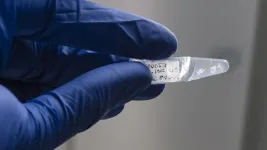Ben-Gurion U. scientists invent an artificial nose for continuous bacterial monitoring
2021-06-21
(Press-News.org) BEER-SHEVA, Israel, June 21, 2021 - A team of scientists at Ben-Gurion University of the Negev (BGU) have invented an artificial nose that is capable of continuous bacterial monitoring, which has never been previously achieved and could be useful in multiple medical, environmental and food applications.
The study was published in Nano-Micro Letters.
"We invented an artificial nose based on unique carbon nanoparticles ("carbon dots") capable of sensing gas molecules and detecting bacteria through the volatile metabolites the emit into the air," says lead researcher Prof. Raz Jelinek, BGU vice president for Research & Development, member of the BGU Department of Chemistry and the Ilse Katz Institute for Nanoscale Science and Technology, and the incumbent of the Carole and Barry Kaye Chair in Applied Science.
The patent-pending technology has many applications including identifying bacteria in healthcare facilities and buildings; speeding lab testing and breath-based diagnostic testing; identifying "good" vs. pathogenic bacteria in the microbiome; detecting food spoilage and identifying poisonous gases.
"BGU has a remarkable track record of sensor development, which has infinite possibilities for real-life application," says Americans for Ben-Gurion University (A4BGU) Chief Executive Officer Doug Seserman. "Our renowned multi-disciplinary research efforts continue to ignite innovation, addressing some of the world's most pressing issues."
The artificial nose uses chemical reactions and electrodes to sense and distinguish vapor molecules and record the changes in capacitance onto interdigitated electrodes (IDEs) coated with carbon dots (C dots). The resulting C-dot-IDE platform constitutes a versatile and powerful vehicle for gas sensing in general, and bacterial monitoring in particular. Machine learning can be applied to train the sensor to identify different gas molecules, individually or in mixtures, with high accuracy.
INFORMATION:
About the BGU Research Team
Other BGU researchers on the team included: Nitzan Shauloff, Dr. Ahiud Morag, Dr. Seema Singh, and Ravit Malishev of the BGU Department of Chemistry and Prof. Lior Rokach, chair of the BGU Department of Software and Information Systems Engineering.
About Americans for Ben-Gurion University
Americans for Ben-Gurion University plays a vital role in maintaining David Ben-Gurion's vision of an "Oxford in the Negev." By supporting a world-class academic institution that not only nurtures the Negev, but also shares its expertise locally and globally, Americans for Ben-Gurion University engages a community of Americans who are committed to improving the world. The Americans for Ben-Gurion University movement supports a 21st century unifying vision for Israel by rallying around BGU's remarkable work and role as an apolitical beacon of light in the Negev desert.
For more information visit http://www.americansforbgu.org.
ELSE PRESS RELEASES FROM THIS DATE:
2021-06-21
In recent years, many juvenile courts have adopted in-home detention with electronic monitoring tethers as an alternative to institutional incarceration. A new study examined whether this approach reduces recidivism among girls involved in the juvenile justice system. The study found that tethers failed to reduce reoffending among the girls; in fact, they may be harmful because in-home detention limits girls' access to treatment programs.
The study, by researchers at the University of Cincinnati (UC) and Michigan State University, appears in Justice Evaluation Journal, a publication of the Academy of Criminal Justice Sciences.
"We believe this ...
2021-06-21
HOUSTON - (June 21, 2021) - Rice University bioengineers collaborated on a six-year study that systematically analyzed how the surface architecture of breast implants influences the development of adverse effects, including an unusual type of lymphoma.
Every year, about 400,000 people receive silicone breast implants in the United States. According to FDA data, most of those implants need to be replaced within 10 years due to the buildup of scar tissue and other complications.
A team including researchers from the Massachusetts Institute of Technology (MIT), Rice, the University of Texas MD Anderson Cancer Center and Baylor College of Medicine published its findings online ...
2021-06-21
Field trials investigating healthy compounds in agronomically important brassica crops have underlined the "immense potential" of gene editing technology, say researchers.
The trials are the first field application of the technology in the UK since the reclassification of gene-edited crops as genetically modified organisms by the Court of Justice of the European Union (CJEU) in 2018.
The results come as the UK Government is determining whether to allow gene-editing approaches for the purpose of food production, following a DEFRA-led public consultation.
"Our results demonstrate the immense potential for gene-editing to facilitate crop improvement by translating discoveries in fundamental biological processes," ...
2021-06-21
New York (June 21, 2021)--The American Geriatrics Society (AGS) has published an updated version of the AGS Minimum Geriatrics Competencies for Graduating Medical Students, which were created to ensure that medical school graduates across the U.S. are prepared to provide high-quality care for us all as we age. A refresh of the original set first published more than a decade ago, the 27 competencies integrate new concepts that have emerged more recently in the field of geriatrics, including frailty and person-centered care, and are framed around five key areas of focus for all geriatrics healthcare professionals.
"The updated competencies reflect an evolution in how we frame the work of geriatrics health professionals, a greater understanding of frailty, and a greater focus ...
2021-06-21
SAN FRANCISCO, CA--June 21, 2021--The progression from a round ball of cells to an embryo with a head and a tail is one of the most critical steps in an organism's development. But just how cells first start organizing themselves with directionality along this head-to-tail axis is hard to study because it happens in the earliest days of embryonic development, in the confines of a mammal's uterus.
Now, scientists at Gladstone Institutes have created an organoid--a three-dimensional cluster of cells grown in the lab--that mimics the earliest developmental steps of the nervous system in embryos. The organoid is the first to show how human spinal cord cells ...
2021-06-21
A study conducted in the Una Biological Reserve in the state of Bahia, Brazil, shows that in a habitat with high hunting pressure the risk of predation has such a significant impact on the behavior of the Yellow-breasted capuchin monkey Sapajus xanthosternos that it even avoids areas offering an abundant supply of plant biomass and invertebrates, its main sources of food.
An article reporting the findings of the study is published in the American Journal of Primatology.
"Many theories in the field of primatology assume that pressure to find food is more important that predation pressure. In this study we were able ...
2021-06-21
A high body mass index (BMI) during adolescence is a significant risk factor for Type 2 diabetes, early heart attack and overall poorer health for young adults, regardless of BMI in adulthood, according to a research letter published today in the Journal of the American College of Cardiology.
BMI is calculated based on weight and height. According to the National Heart, Lung, and Blood Institute, BMI categories are defined as: less than 18.5 kg/m2 is underweight; 18.5 to 24.9 is normal weight; 25 to 29.9 is overweight; and 30 or greater is obese.
Researchers analyzed the BMI z-scores, which is relative weight adjusted for a child's age and sex, of 12,300 adolescents ...
2021-06-21
Data captured in NCDR registries is similar in quality, depth and granularity when compared to data captured through clinical trials, according to research in JACC: Cardiovascular Interventions that compared data from the DAPT Study to NCDR CathPCI Registry data. This is good news for streamlining data collection and supports recent efforts to standardize data elements and definitions used in clinical trials and registries.
"We found an overall high level of similarity in data between these two sources. This suggests that registries may also be suitable to support baseline data collection for many clinical studies," said senior study author Robert W. Yeh, MD, MSc, director of the Richard A. and Susan F. Smith Center for Outcomes Research in Cardiology ...
2021-06-21
The use of statin therapy in adults 65 years old or older is not associated with incident dementia, mild cognitive impairment (MCI) or decline in individual cognition domains, according to a study published in the Journal of the American College of Cardiology (JACC).
Cognitive decline and dementia are major health concerns in older individuals, affecting about 10% of people over 60 years old. Statins are used to reduce low-density lipoprotein cholesterol, or bad cholesterol, thus they are a fundamental treatment for prevention of primary and secondary cardiovascular disease (CVD) events. The Food and Drug Administration released a warning in 2012 about cases of apparent short-term ...
2021-06-21
It's a treasure trove of data: the global geodatabase of vegetation plots "sPlotOpen" is now freely accessible. It contains data on vegetation from 114 countries and from all climate zones on Earth. The database was compiled by an international team of researchers led by Martin Luther University Halle-Wittenberg (MLU), the German Centre for Integrative Biodiversity Research (iDiv) and the French National Centre for Scientific Research (CNRS). Researchers around the world finally have a balanced, representative dataset of the Earth's vegetation at their disposal, as the team reports in the journal Global Ecology & Biogeography.
Global issues and questions require global answers. "If we want to understand or predict how climate ...
LAST 30 PRESS RELEASES:
[Press-News.org] Ben-Gurion U. scientists invent an artificial nose for continuous bacterial monitoring



